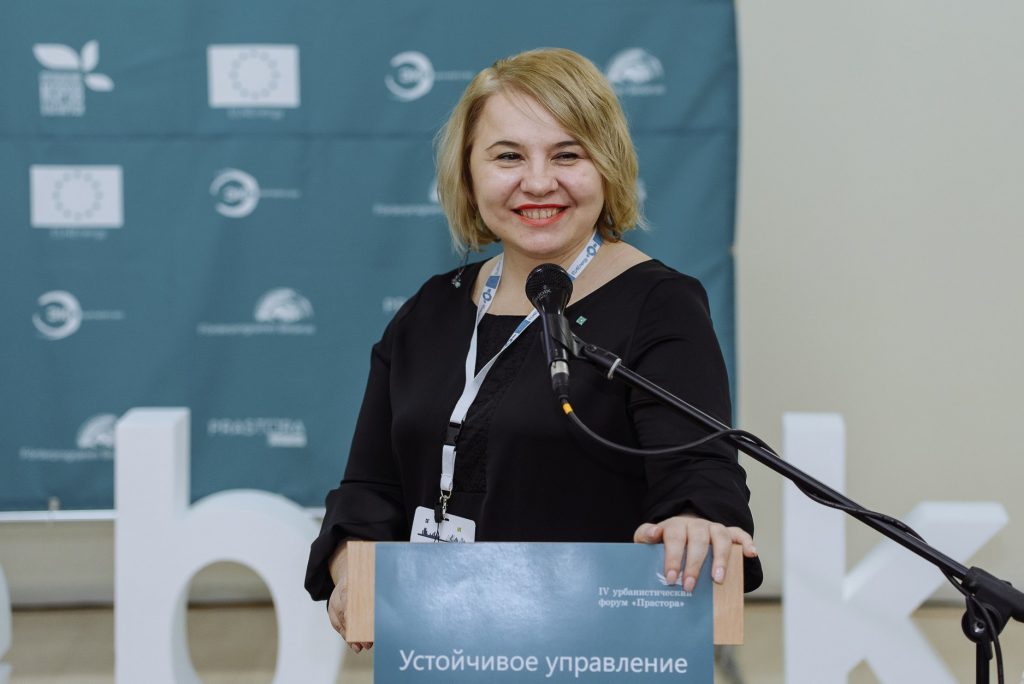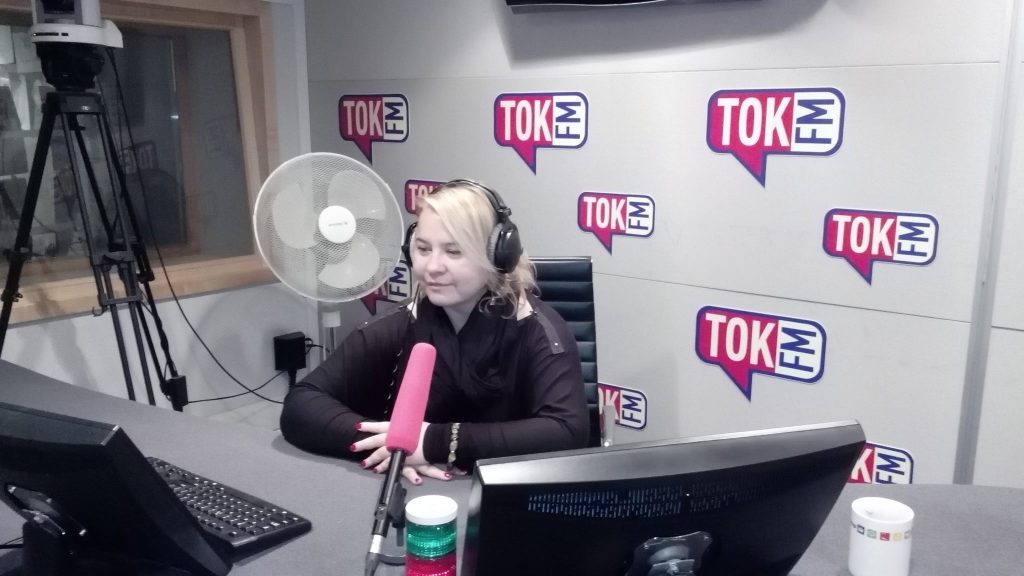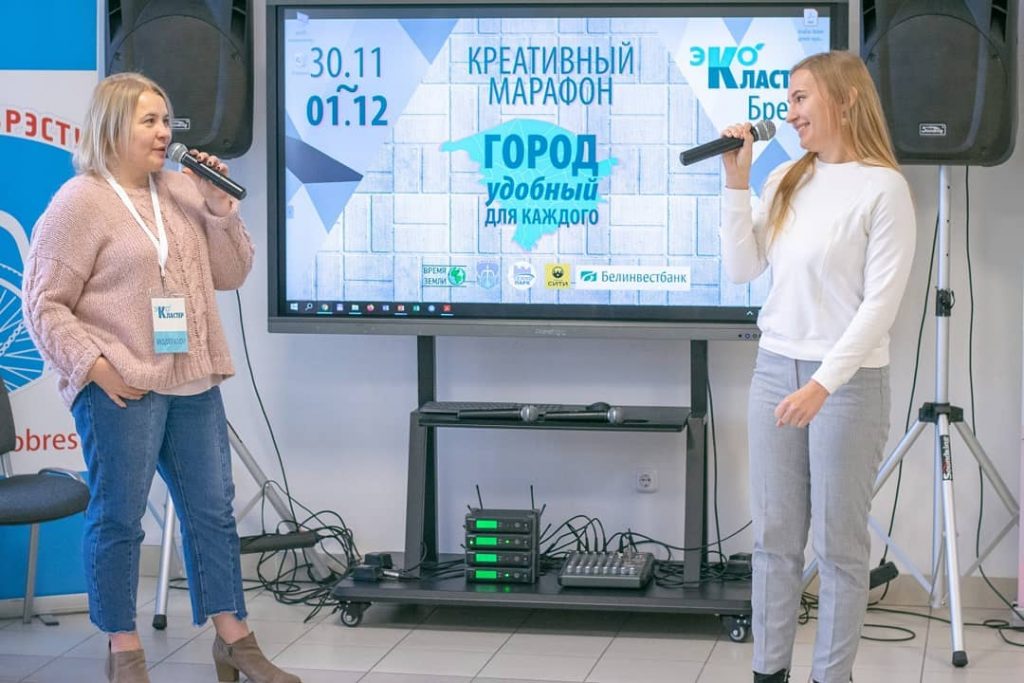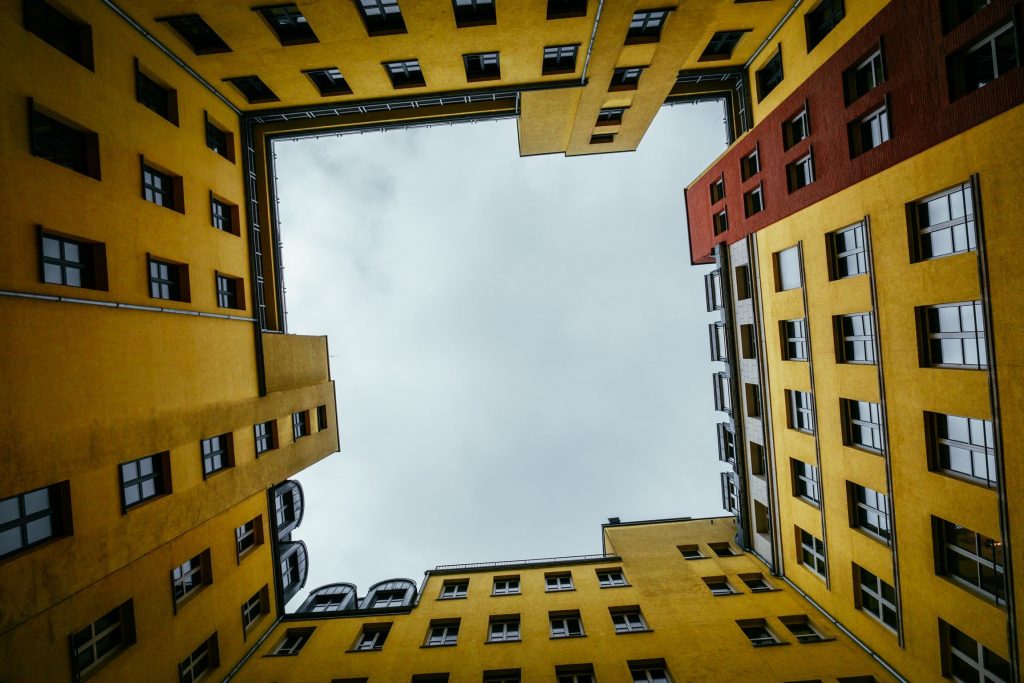Aksana graduated from Viciebsk State University’s Artistic and Graphic Faculty. After a year, she was enrolled to the Belarusian State University’s Theory and History of Culture major to get her second university degree and moved to live in Minsk. She taught, wrote her thesis and research articles and was sure of her academic career in Minsk. Yet, in 2009 she got married and moved back to Viciebsk.
«I felt like staging a park festival, but ended up founding my organisation»
– In the regional administrative centre, my academic work was not in a high demand, – says Aksana. – About a dozen of philosophy and culture theory lecturers were all the city needed and new staff members were not welcomed.

Following yet another job interview I entered a cafe and heard the Europe Plus radio announcing its sound engineer vacancy. I made a call and offered moderating a culture programme series. And I was hired! To host the Guest programme on Fridays live. My work record book has a plain entry: Radio Airwaves Host. To be true to life, to begin with, I was delegated to Jury Lizienhievič, a renowned Viciebsk theatre director, to take an elocution course.
An amazing Bohemian life streak commenced, with theatre lessons, studio advertisement recordings, live broadcasts or live interviews. My pocket-book got ever thicker and my social capital ever stronger, while I had an ever clearer understanding that what I was doing was journalism.
Apart from radio, Aksana worked as an editor with two weekly newspapers – The Vitebsky Prospekt and The Tvoy Gorod. The publications were commercial, which meant that big tasks had to be addressed with limited resources and putting out every single week 24 pages of original author content.
Utterly exhausted, our protagonist took a sabbatical leave, but could not wait till its end and made an offer to her friend Aliena Piatrova, a florist artist, to become her artistic curator.
Jointly, they implemented four projects: Embrace a Tree, the Circle of Life, DOSKI and a floristic show entitled Viciebsk: a City of Angels.

– And then I came to know Śviatlana Dubroŭskaja, the Chairperson of the Viciebsk Women’s Club NGO. The club worked with the topics of HIV/ AIDS, gender equality and women’s self-fulfilment. To start with, I created for them social media pages or wrote press releases, but then went to Warsaw to take a course entitled: Interaction among NGOs Active in the Contagious Disease and Mass Media Sphere.
– It was from Śviatlana that I learned about the Office’s course Leadership in Local Communities back in 2015. I made up my mind to apply and came out with an idea of my land art festival in a park, which I planned staging as a cultural and educational project.
At first, I was rejected and explained that a local community is about the communities of a stair-well, court-yard, village or a street, but no way that of a park. However, I was lucky: at the very last moment someone withdrew and my nomination came to be heeded. I remember clearly, as though it were yesterday, that I had a call from Maryša Korž, when I with my team was visiting the Frunze Park to do a strategic terrain reconnaissance. This was how I have found my way to the third sector.
How to be a professional townsman?
The course turned out to be an applied one with homework assignments and deadlines. It was exactly then that Aksana got the understanding that she was ready for something bigger, or her own organisation.
– For what am I grateful to the Office? For a high level of all its events. Before that, I had seen some NGO events, which, however offending it might sound, had a narrow-minded parochial nature, a kind of closed-door hobnob attended by the scratch-my-back-and-I’ll-scratch-yours type of folks. As far as the Office is concerned, it makes its events like a cool training centre.
I have always had lots of questions to ask the NGOs. I have perpetually had a feeling that their information was esoteric. Yet, after engaging with the Office team I grasped that could ‘enter that river’ all by myself.

Thus, Aksana’s ideas on creative economy and an art project were transformed into the Prastora (Space) urbanistic forum. That same year, she became a founding director of the Prastora Centre for Urbanistic Projects and Initiatives, its major mission being: «We change the cultural and spatial landscapes of our towns and cities».
– The Prastora Centre is a non-governmental and not-for-profit organisation, – explains Aksana. – We make a focus on the human relationships and bring a vital message: the city is more than its buildings; the city is about its people.
We support the city grassroots initiatives and informal education; we offer our expertise and mentorship, and implement some applied projects in the areas of social inclusion, city and climate, and space and design.
All of these are no empty words for us. We do our best to include in the society all the people, even those who are shunned or considered awkward cases. We make a focus on conscious consumption and creative economy development, i.e. urban population self-employment.
We have our Applied Urban Studies School, the Prastora.info media project and an annual Prastora Urban Forum.
– The Applied Urban Studies School is about becoming a professional townsman. Learning how to see several scenarios within the urban space: children’s, teenagers’, young people’s and adults’ ones, the latter one being split into the family and individual scenarios. Being able to speak about the city with the administration, urban planners or project implementers.
But what we see so far is a Philistine, whose view of the city is a subjective one, – shares her thoughts Aksana. – He is submerged in a scenario of his own and demands addressing his local issue, only. As a rule, any other scenarios are indifferent to such a townsman, because he believes that his own one is the major one and the only one that matters.
Now we are at the stage of rolling out a programme to provide knowledge to the city dwellers on their city as a sophisticated system: how to use it in terms of environment, economy, visual comfort or bringing up new generations.
A visionary, rather than an activist – the one to make the future
– I do not refer to myself as an activist or an urbanist, – smiles Aksana. – If I have to introduce myself, then, depending upon the context, I would be a culturologist, journalist, urban studies specialist or all the latter things combined.
I learned about activism in 2015, when I got an idea of the Viciebsk Women’s Club activities. An activist, in my opinion, is an active person, who sticks out her or his neck, but does not do so for a long time, – our protagonist jokes. – Speaking about the Prastora, we rather act as the urbanistic world guides.
Visionaries and pro-Western people, because we advocate all the new things and a better future. By the way, do you have an idea that most managerial mistakes originate from the fact that people are reluctant to think about the future; instead, they think about the past and a tiny bit about the present.

As for us, we are researchers, aren’t we? And we test the city with our actions. All the forms used in our work by the Prastora were new for entire Belarus, let alone Viciebsk. For the first time ever the Prastora Urban Forum (2016) in a city park in partnership with the City Executive Committee, for the first time ever the city land art festival Northern Wind (2016), for the first time ever the word parklet used in the Belarusian NGO discourse, for the first time ever «The Other Kind of Foo» street vegetarian fast food festival, for the first time ever the regional 48-hour Smart City hakaton (2018), and the first ever sakuras in the Botanical Garden (2018).
We even went as far as making an experimental decorative grass lawn in the city centre using the excess sludge peat from the city waste water treatment canals.
The Prastora has no clear demarcation borders or conventions; we advocate synergy. Our annual Prastora Urban Forum event has grown into informal inter-sector visionary platform to promote a sustainable urban development. To be true to life, regrettably enough, this year the Prastora Urban Forum has been cancelled due to the pandemic.
We are all aware that creating new cultural precedents, products or artefacts is an extremely challenging business, whether in financial, resource-related, moral or mental terms. I am often asked the question: «Why are you doing it?» And I keep on saying: «Because activism is not for a long time, but the one who remains in an in-commission status for longer than 3 years for me is transformed into a visionary, or the one who makes the future».


